The Product Manager (or PM) is an essential role within any organization building technology products or software. While the responsibilities of a product manager can vary considerably depending on the industry and organization, generally a PM helps manage the user research, planning, strategy, and execution of a product.
But in 2021, what does that look like? What do product managers do in their day-to-day, and what are the skills they need to excel on the job? How can you build a career in product management?
As the place where driven, ambitious women gather to build their careers in tech, we have a lot of incredible women PMs on Elpha that can answer these questions. So, we asked them.
In this guide, you’ll hear from 40+ women who work in product at top tech companies and emerging innovative startups right now. We’re sharing all their insights about their day-to-day responsibilities as a PM, how to build a career in product management, and the key skills you need to learn to land a job as a product manager in 2021.
We’ll cover:
What does a product manager do?
The day-to-day as a PM
One thing we heard over and over again from women working in product management is that no two days look the same. Many PMs love their roles because of the variety of tasks they’ll have on their plate each day, and because of the different responsibilities depending on their team, product, and company.
“Part of what's appealing about product management to me is that there is no "most of your time" – it requires such a diversity of activities and skillsets. I spend my time talking to stakeholders, customers, engineers, designers; analyzing previous efforts; and documenting needs, ideas, and releases,” is how Jordyn , now VP of Product at Brio Systems, puts it.
In a typical day as a product manager, priorities will depend on where your team’s current focus is, and which part of the product lifecycle phase you’re in. Days can look very different when you’re discussing a new product idea compared to post-launch of a new feature.
Marily , AI Product Manager at Google, shares: “On a day to day basis, I manage multiple technical products that are somewhat related to each other, but are in different stages of the product lifecycle (i.e. from early explorations all the way to already launched products). This means that on every day I get to ‘wear’ different hats and collaborate with the different stakeholders of each project.”
But regardless of the product lifecycle stage, product managers spend a lot of their time facilitating conversations and building relationships. Shannon , Senior Product Manager at Shopify, mentions the importance of her conversations with UX, engineering, and data teams to strategize product direction:
“I spend most of my time communicating and building relationships: getting stakeholder buy-in, speaking to and hearing from the team, reiterating information in different formats to different people, ensuring alignment and distilling information so that any reader/viewer can get the necessary info as quickly as possible.”
Clearly, time spent understanding what other teams and stakeholders need, and figuring out how to give it to them, is an essential part of the product manager role.
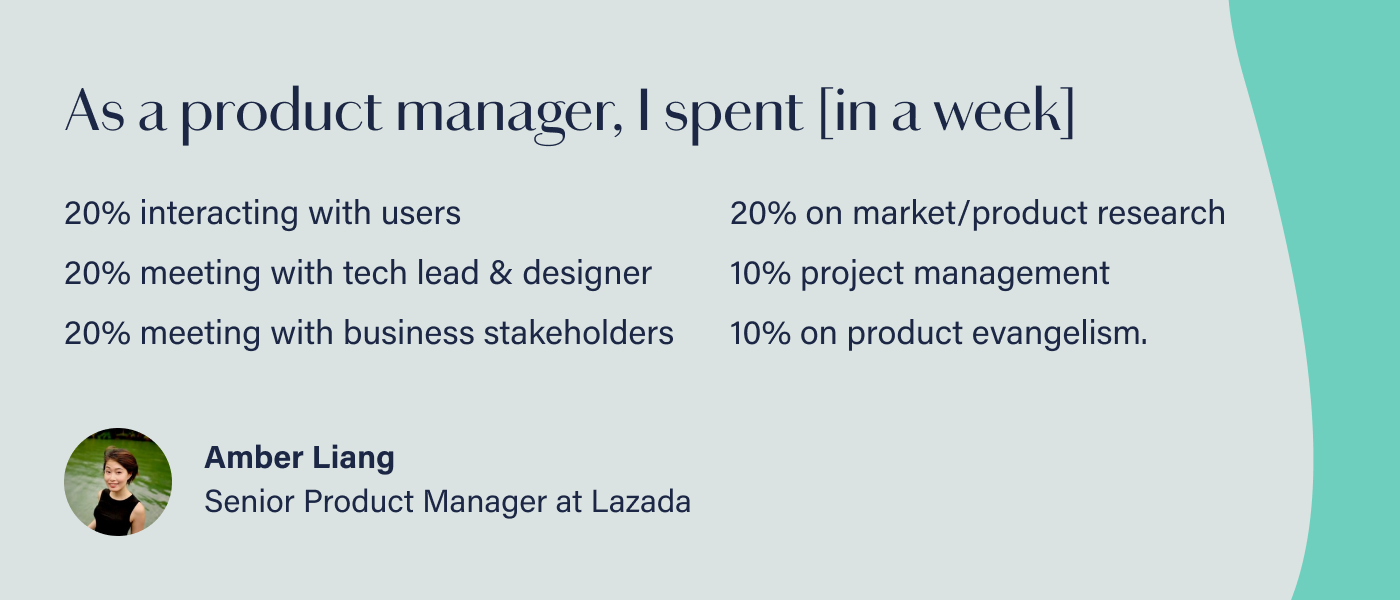
Here’s a breakdown from Amber , Sr. Product Manager at Lazada:
“As a product manager, I spent 20% of the week interacting with users to observe, receive feedback; 20% meeting with tech lead & designer, 20% meeting with business stakeholders, 20% on market/product research, 10% project management, and 10% on product evangelism.”
To sum it up, a few of the most common responsibilities PMs have include:
Research: Talking with current users of the product to find clear themes and needs to inform your product roadmap
“My favorite part of my job is when I get to speak to our users, understand where they're coming from and try to identify ways we can solve their problems.” - Neva , Director of Product at Platypus
Strategy: Thinking through high-level product strategy, setting the product roadmap, and then holding strategy meetings with internal stakeholders
“As a product manager, I spend most of my time strategizing and implementing the strategy. Development resources, skill sets, budget and timelines are limited. Thus, a product manager needs to strategize to understand what the company vision is, what the product vision is, where the competitors are, and what can be done given the constraints.” - Shelly , Founder & CEO at GiftVolo
Communication: Holding cross-functional meetings to problem solve and share information with other teams such as design, engineering, lifecycle marketing, UX, etc.
“Given remote and async communication, this has become more apparent and critical. You have to get teams on the same page about the strategy on where the product is heading in the larger company's mission.” - Arti , Product Engineer at Coinbase
Planning: Planning future product or feature releases, ironing out all the details (sometimes months ahead of time!)
“One of the main things I dedicate my time to is planning the next feature or product we'll be working on. This usually includes analyzing the performance and usage of existing features, doing market research, and liaising with other teams and stakeholders, before moving into the active planning stage of these projects with design, spec writing etc.” - Avigayil , Product Manager at Duda
Prioritization: Getting comfortable with saying “no” (or at least “not right now”) to various stakeholder requests
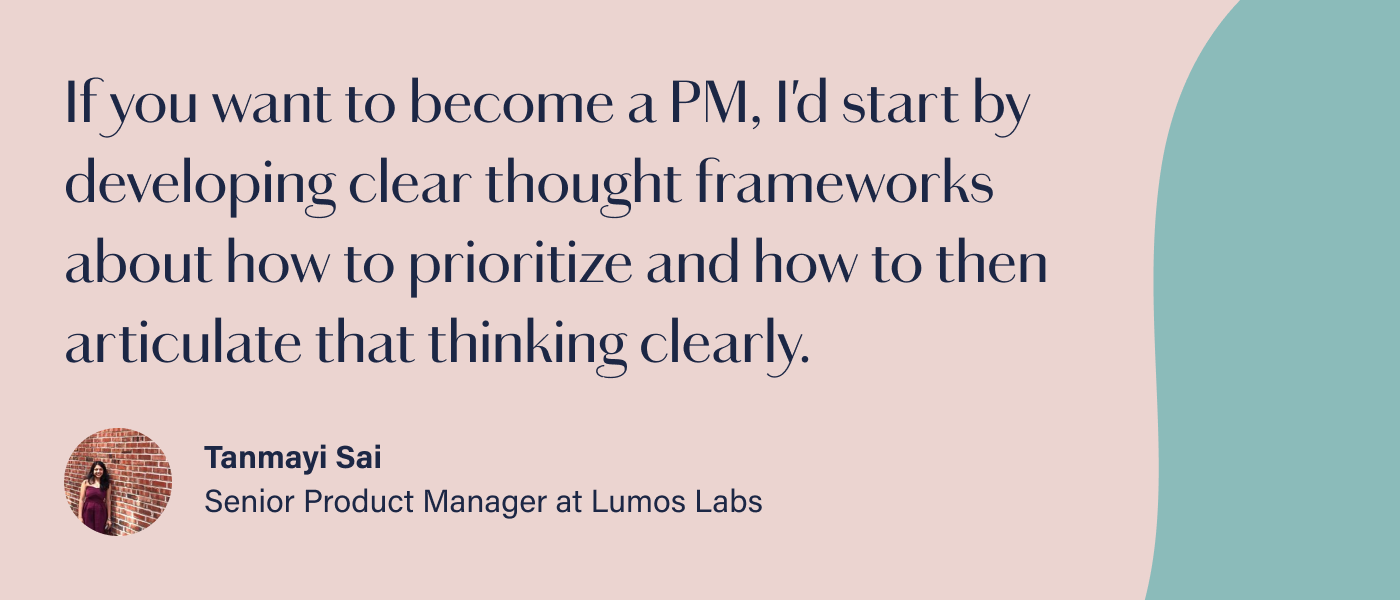
"Prioritization is key to product managers, whether it’s your personal time or the product. If you want to become a PM, I'd start by developing clear thought frameworks about how to prioritize and how to then articulate that thinking clearly.” - Tanmayi , Sr. Product Manager at Lumos Labs
How can you become a product manager?
Career paths to get into product management
Product managers can have all sorts of backgrounds. We talked to women that studied everything from history, political science, linguistics, fashion, journalism, economics… and today they’re all working in product. Here are a few of their stories about how they transitioned into product management:
From business to product management
“I studied business & marketing, and worked in business & strategy for a few years in tech start-ups. I became a SCRUM master two years ago and did a transition to product management. Now I lead product & growth for another tech start-up. My experience in business development and my training on the side helped me get this role.” - Alexandra , Product Manager at Novoresume
“I gained experience in product management through product projects as a management consultant. Started as an analyst and worked my way to being the Product Owner of an e-commerce site with 1M+ active users! I studied Economics in college, but it was really the experience of grooming sprints and working with the team that helped me learn the most.” - Selina , Freelance Product Designer
“I started as a business analyst working on very technical requirements and slowly moved up to Product Owner-type responsibilities before moving into a more modern PM role. My undergrad degree is in Business Admin (concentration on IS), which did involve some coding classes.” - Emily , Director of Product at Pareto Intelligence
From customer support to product management
“I started in Customer Success and Tech Support. I dabbled in marketing and sales for a bit and settled on a higher-tier tech support role that served as a sort of liaison for all departments needing support. I then moved into a Project Management/Quality Assurance function. It was from there that I got promoted as the company's first Product Manager.” - Leah , Product Manager at Rehearsal
“My background is in Customer Support. While leading a CX team in charge of a specific product, I worked very closely with the product team to make sure that the voice of the customer was being heard. I realized I wanted to work not only with Product, but IN Product, so I did a Coursera specialization on Software Product Management. I also wrote a book about how to lead remote teams, since that’s an expertise that's department independent. In the end it was the combination of my experience with remote work and the very obvious motivation around doing whatever it takes to learn what I needed to learn that got me my first opportunity.” - Valentina , Head of Product at Klaus
“My path to becoming a PM was a surprise. I joined a startup company in a support role and within a couple of months was asked to join the product team. I think in my case, it was the right place, right time and potentially an acknowledgement of my “scary attention to detail”. When I joined the product team, it was in a new role the company owners had created called “Customer Champion”, but I quickly found that I was doing so many other jobs outside of what the role suggested. If something needed to be done, I stepped up. I wore all the hats that would help my product and my team. I was in the Customer Champion role for 4 years, but during that time discussions about the work I was actually doing and my title kept coming up, which eventually progressed me to being promoted to Associate PM.” - Joanne , Associate Product Manager at Teamwork Desk
“I started my career as a customer success manager at a very small startup that didn't have any product managers. At some point engineers and designers started asking me my opinion on new features and what we should build and I enjoyed it and was good at it and then gradually transitioned to becoming a PM full time. I studied economics in college (but didn't graduate) and don't feel like there was anything academically that would've really prepared me for the job or that I wish I had studied. Having a computer science degree may be helpful to get the job but I don't think it's actually needed to do the job.” - Claire , Product Lead at Noyo
From engineering to product management
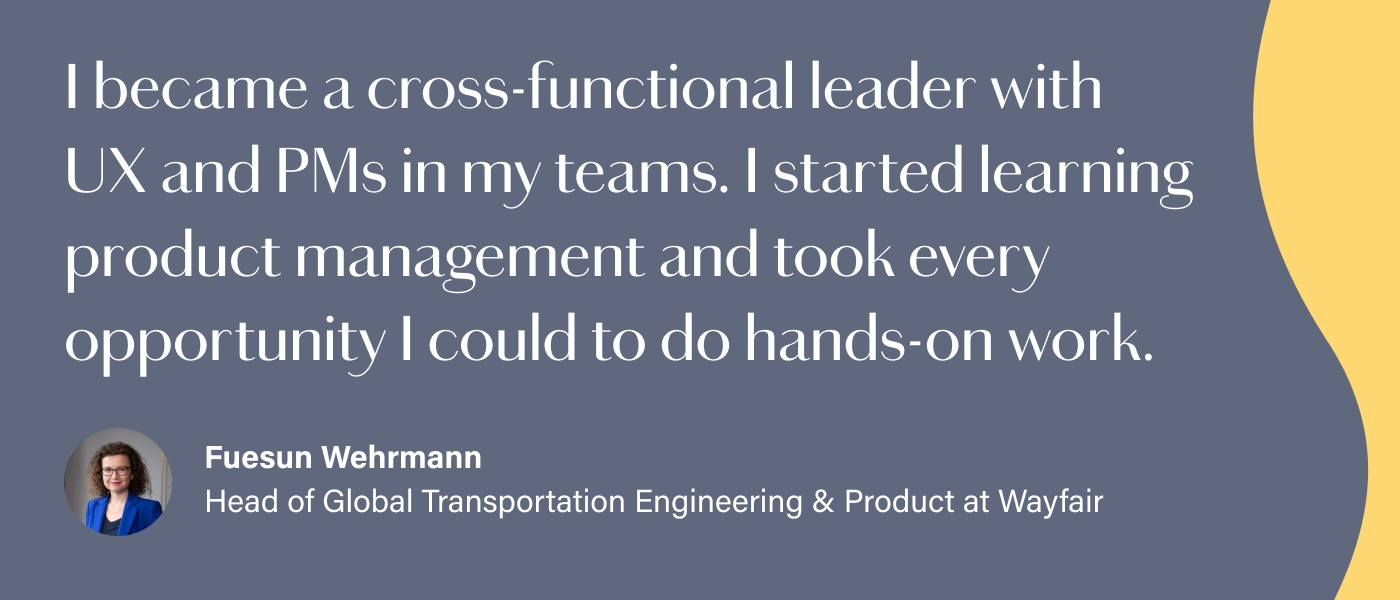
“I worked as an engineer and an engineering leader first. I started mentoring startups for a Google program which gave me exposure to an awesome community of designers and product enthusiasts. Around that time, I became a cross-functional leader at my company with UX and PMs in my teams. I started learning anything I could find about product management and also took every opportunity I could to do hands-on work. After seven years, as a leader for PM orgs and a tech-oriented PM myself, I feel confident and super engaged in this field.” - Fuesun , Head of Global Transportation Engineering & Product at Wayfair
“I was an engineer working on software and hardware for many years before I realized I had been doing product management in all my roles, just didn't have a title. I still have a blended role but play a smaller part in the how than the why.” - Rashmy , Product Owner and Staff Firmware Engineer, Johnson & Johnson
“I started as a QA engineer, then I was a QA lead, pre-sales engineer, project manager. I had a technical background, so my weakness was the business side of the job. I took multiple courses in finance, business and strategy planning.” - Lilia , Product Manager at Intermedia
From HR/recruitment to product management
“I left tech for a little over a year to lead marketing for Canada's largest organic craft brewery and then came back in order to join Shopify in 2015 as an Executive Recruiter. I transitioned into Product Management at Shopify after having put in place the hiring process for Product Managers and bringing that function in-house. I've been in Product for 5 years now, starting as an APM and growing into a leadership role.” - Shannon , Senior Product Manager at Shopify
From law to product management
“I was a lawyer and then legalops manager before transitioning to product management for a legal tech company. I studied history & Spanish in undergrad before getting my law degree. I didn't plan to become a PM, but gradually transitioned over!” - Taly , Product Manager at Evisort
From website design to product management
“My career path to becoming a product manager started as a web designer in 2002. Prior to that I had taught myself frontend coding like HTML, CSS, and javascript for fun. When the creative agency that hired me found out I could code, they had me build my own designs. And when they realized I could translate what I was doing to friendly terms a client could understand, they gave me the first project manager position at the company. Project management became product management a few jobs later, and the rest is history!” - Patti , most recently VP at Imperfect Foods
From marketing to product management
“I started my career in marketing for a B2B and B2C consumer goods company. After working in marketing full time for a few years I spent one year freelancing for different high tech companies and startups. I then made my move to product management in a B2B SaaS startup.” - Avigayil , Product Manager at Duda

“I have been a tech nerd since I was a child, and I believe that had a lot to do with how I landed in Product. I started out in early-stage startups in marketing and growth-oriented roles, eventually moving into an Associate PM role, then product management. In college, I studied Linguistics, which has been really helpful in picking up on the nuances of customer responses during user interviews! Somewhere along the way, I taught myself HTML, SQL and beginner Ruby on Rails, all of which sparked my passion for building things.” - Elena , Product Manager at Planned Parenthood
“I went to undergrad for business, focusing on marketing and retail. Then, I worked for the first five years of my career in luxury fashion doing buying, planning and marketing. I was recruited by an acquaintance to join a small startup that was looking for a PM (did not realize how lucky that was at the time), and I made them promise that they'd train and support me on the job while I learned and got up to speed.” - Helena , Product Manager at Flatiron Health
From public health to product management
“I studied molecular biology, worked in a non-profit for a few years, did a masters in Public Health, worked in academic - and then got fed up with the lack of impact I was having. I set my eyes on working in software as I felt the agile iterations lent themselves much better to finding solutions that actually mattered. At first I applied to any and every job (user ops, customer success, operations, partnerships, etc.) and didn't get any offers (which was really disheartening). Because I'd had experience leading teams from my time in NGOs, a friend recommended I consider product. I spent 6 months re-skilling (see my study guide here ) before applying again, now specifically to product management roles. I got three offers! - Hanne , Product Manager at accuRx
From project management to product management
“I studied Journalism in undergrad and started my career at a media startup in NYC. The application kept crashing and I didn't want to ask someone for workarounds anymore. I just wanted to fix it myself. I moved into a project manager role leading many editorial and development projects and eventually into product where I lead a user migration, site redesign, CMS creation and fix many bugs along the way.” - Kellie , Product Manager at Buildout
From data science to product management
“My path was academic researcher -> Data Scientist -> Product Manager. I was working on very customer-facing data projects, which effectively showed us what our customers were looking for that our product didn't offer. I became the first PM at my company.” - Julie , Product Manager at Motryx
From software development to product management
“After graduating with Computer Science I began my career in software development and enjoyed developing solutions that users found to be easy-to-use. This experience, an interest in financial technology and my passion for entrepreneurship drove me to become a product manager.” - Nipunika , Cofounder at InnovTechies
From psychology to product management
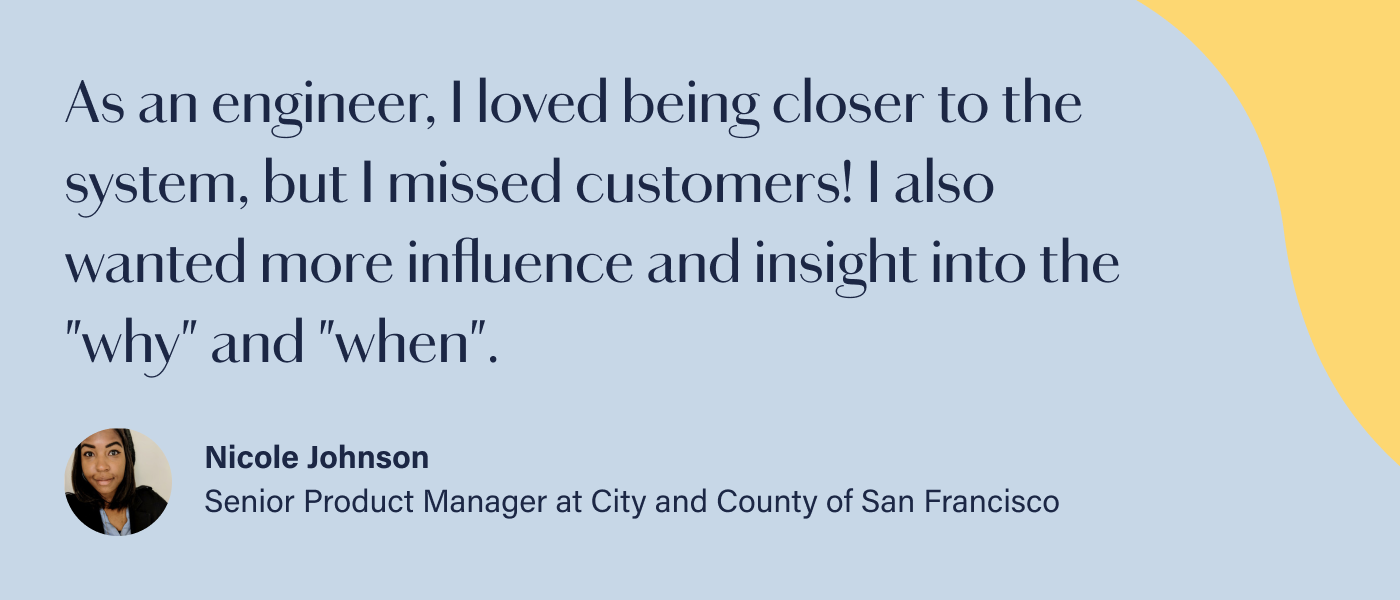
“I studied Psychology; I worked in mental health before pivoting to libraries. My obsession with helping and understanding people has been a theme. I was a Consultant (essentially customer success/service but with a bit of HTML fiddling required) at the first tech company I worked for. I was planning to get my MLIS but teaching myself how to code on the side. Because I had some access to the system's inner workings, I started doing advanced customizations to meet customer's needs. That led to me being moved to the engineering team. As an engineer, I loved being closer to the system, but I missed customers! I also wanted more influence and insight into the "why" and "when" so my company let me move again, this time to Product.” - Nicole , Senior Product Manager at City and County of San Francisco
Clearly, the university degree you get or the role you’re working in currently doesn’t matter nearly as much as your curiosity to learn product management and your willingness to take every opportunity you can to do hands-on work. Many of the PMs we spoke to mentioned teaching themselves new skills - whether on the technical side with HTML, SQL, etc. or on the business side - such as finance, business, and strategy planning. But you might be wondering, just how technical does a product manager need to be?
Does a product manager need to be technical?
The technical skills a product manager should have
How important is it for product managers to have a technical understanding or background? The answer: very important, somewhat, or not a lot, depending on the product you work on and the make-up of the rest of your team.
“Depending on the product ownership and make-up of a product team, there are some roles requiring more technical understanding. For example, it would be difficult to hire a non-technical PM for a large data project as they would take a lot of the engineers time explaining concepts to them, which would be a large opportunity cost to executing faster.” - Heather , Cofounder, Head of Product & Operations at Candidly
In most cases, you won’t need to know how to code as a product manager. But you will need to understand enough technical language to be able to communicate with development & engineering teams effectively.
“Understanding how a database works and how parts of frameworks and systems come together will go a long way in discussions with designers and engineers. Understanding what people usually mean when they say "front-end" vs. "back-end" and the components of each will take you a long way,” says Nicole , Senior Product Manager at City and County of San Francisco.
You’ll also need to be technologically savvy to drive decision-making on the product.
“The technical skills you need are the ones that allow you to set realistic product strategies about what can be built. Ideally you have an idea about the engineering feasibility of a solution before you start fleshing it out in more detail with the builders. You also need to be able to communicate effectively with the building team and have an understanding for which things are complex vs simple. - Stefania , CEO & Co-Founder at Avo
A technical understanding of the amount of effort it will take to develop software is crucial to building relationships with engineering teams.
“I think understanding engineering culture is one of the most important things you need to do. Make friends with an upper-level engineering manager who can be honest with you about communication styles. You'd be surprised what is offensive to an engineer or a designer that wouldn't be offensive to someone in Sales.” - Leah , Product Manager at Rehearsal
Leena , who is a Technical Product Manager at Centro, weighs in:
“Understand that engineering is itself a craft, and senior and principal engineers follow industry best practices. It's not just about coding and getting something deployed to production. My recommendation would be to get familiar writing SQL that will help you make data-driven decisions, and so you don't waste engineers' time in asking them for this. However, if you're a Technical Product Manager (TPM), then YES, you do need to be more technical. And remember, never treat your engineers or teams like they are "resources". We're all on the same team working towards a goal. You will have the authority to decide what gets built, but leave it to the engineers to decide what the solution and implementation is.”
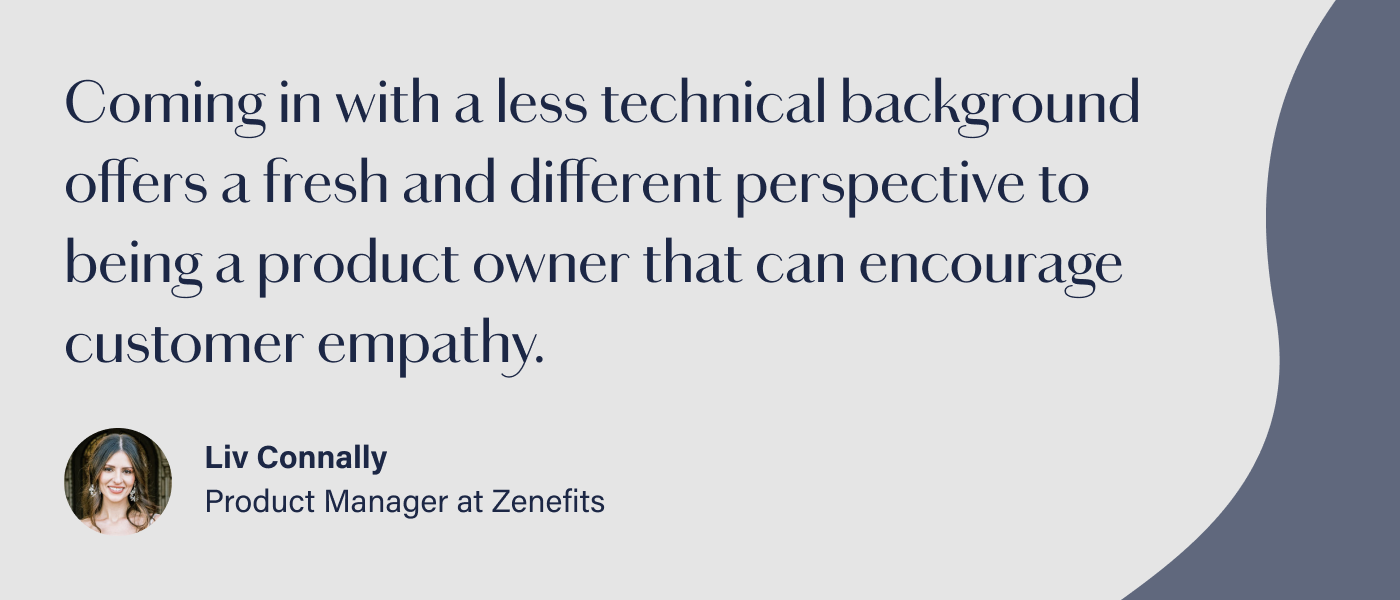
Even if you initially come into the PM role without much technical experience, you’ll need to be willing to learn on the job.
Liv , a new Product Manager at Zenefits, says, “I don't think a PM needs to be technical right off the bat. Actually, initially coming in with a less technical background offers a fresh and different perspective to being a product owner that can encourage customer empathy. I do believe it's very important to gain technical knowledge as PMs grow.”
Tess , Product Manager at Wonderschool, shares her experience:
“I'm not technical, and I used to feel really embarrassed about that and worried my career would be capped. But actually, it's been fine. I do have to push myself to understand how a feature or product works under the hood and not just what the user experiences.
I've taken intro coding classes and SQL, and I've spent lots of time researching payment processing, how APIs work, etc, and all of that has been helpful. I also work closely with engineers to understand what's going on.”
To sum up the answer to the question of if you need to be technical as a product manager, here’s a quote from Lindsay , Product Manager at Strava:
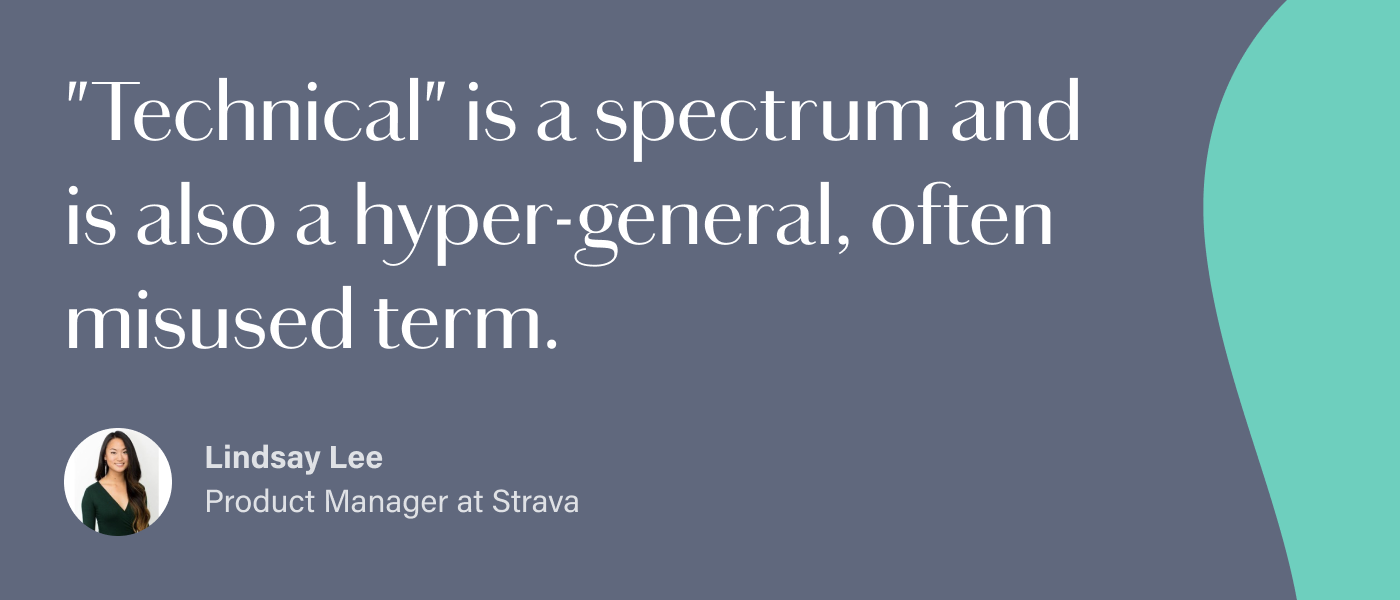
"Technical" is a spectrum and is also a hyper-general, often misused term. What you need to be able to do is understand how systems fit together, what their capabilities and limitations are, and know how to ask questions that will further your understanding and the solution. Having an empathetic and communicative engineering counterpart will take you far but only if you know how to ask the right questions and approach everything with genuine curiosity at a systems level.”
So, beyond developing some technical knowledge, what are the other essential skills an aspiring product manager should learn?
What should you learn if you want to become a product manager?
Here’s where you should start if you don’t have any experience yet
We posed the question to product managers on Elpha: What skills should an aspiring product manager focus on learning if they don’t yet have any experience?
Many of the answers we received were super tactical and should help get you started on building your product management skillset today. Here’s what they said:
Learn about empathetic leadership and communication. The product managers we interviewed told us empathy is the #1 skill that makes someone good at their job.
“Empathy, trust-building, leadership (without authority), reading a room, active listening, interviewing skills, and radical candor are all critical for a role where folks often find themselves with many stakeholders whose needs can't all be met at the same time or with the same solution.
Knowing myself, knowing others that I work with, and knowing how we effectively work together has been instrumental (and has also led to real challenges). I recommend a book like Peter Drucker’s "Managing Oneself" to help identify more effective ways of working with different team members.” - Julie , Product Manager at Motryx
Improve your active listening skills.
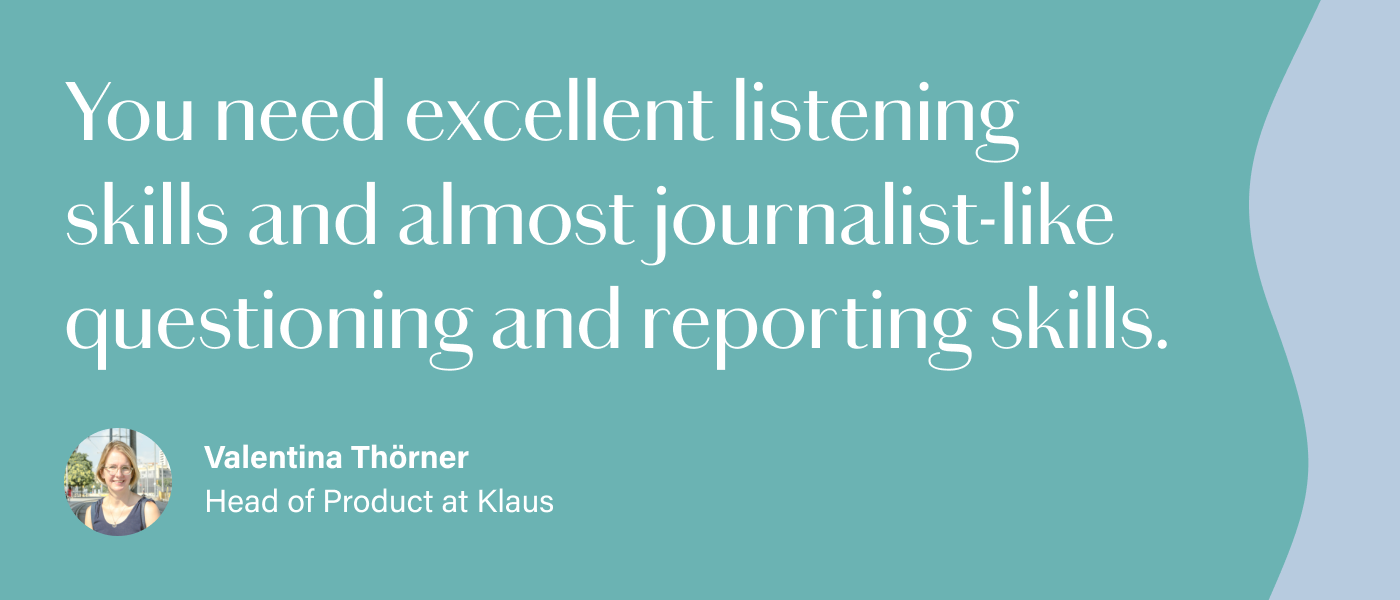
“You need excellent listening skills and almost journalist-like questioning and reporting skills. You'll be the one who figures out what the exact pain points are to then explain them to the rest of the team. You need to be able to translate your user research findings so that the engineer, the UX designer, and everyone else on your team understands what you are trying to solve.” - Valentina , Head of Product at Klaus
“Focus on mindful listening. Very often, you'll hear about issues and it's natural to jump to conclusions. However, if you really dedicate yourself to active listening, you'll find there is a deeper issue or unsolved need that isn't being addressed. When we are all chasing deadlines and running on tight schedules, it is exceedingly difficult to practice mindful listening, but it is all the more crucial for solving hard problems.” - Elena , Product Manager at Planned Parenthood
Learn a prioritization framework (like RICE) to guide your future product roadmap decisions.
One of the key skills a product manager should have is the ability to analyze and synthesize. This “gives you the ability to set priorities based on what the vision for the product is, helping you to differentiate and decide what to focus on,” said Shelly , Founder & CEO at GiftVolo.
Hone your communication skills and ability to say “no.”
An aspiring PM should learn how to translate requests into problems (meaning focusing on what people are trying to achieve rather than what they're asking for) and understand the nuance in communicating with the CEO vs. the support team, for example. You also need to learn how to turn down ideas gracefully.
“Be comfortable with saying NO. In my experience, too many people try to people please and hem and haw around an answer. This only pisses people off. Be brave. Say no if you're never going to consider it.” - Holly , Sr. Director of Pharmacy Performance Advisory Solutions, McKesson
Practice getting better at managing your own time and organizing your personal systems.
“Time management is a very important skill. Many people say product managers need to be comfortable with ambiguity, which I feel is a slight misnomer. Really, you need to come up with your own systems to be organized so everything you’re responsible for gets done, and things don't slip through the cracks.” - Leena , Technical Product Manager at Centro
Develop a product mindset by getting curious about the products around you.
Here’s what Lilia , Product Manager at Intermedia suggests:
“Start thinking about products around you. Why was the product created? For whom? How do they monetize it? What limitations do they have? What might the next feature be?”
Leah , Product Manager at Rehearsal, says the ability to think like a product person is really hard to understand and master, but here’s what she recommends:
“Read any books or articles you can get your hands on about creating good products. It's a completely different mindset from that of a CS or salesperson. I would narrow your focus on content surrounding the concept of an MVP to help better understand what makes or breaks a shippable product.”
Get resourceful with your learning now, to prepare for a PM role.
It’s critical to be resourceful in this role and be prepared to make decisions even when you only have limited information. Start building up those skills now by learning and reading everything you can about product management!
“Being able to proactively help yourself and find answers in unexpected places is a key skill, as is knowing how to read between the lines and how to ask good questions. These skills will benefit you both inside your company and externally with users.” - Merissa , Head of Product at CodeControl
Hopefully, all these ideas give you a good place to start. Wherever your skills are weakest, is the area you should prioritize as an aspiring PM. As Jelena , Chief Product Officer at Zuper put it:
“Product sits between business, tech and design. And each product person comes with more or less knowledge and interest in the three. I think it's important to spend time learning and understanding the ones that each individual is weaker in. But even more importantly than those hard skills, it's critical to learn how to make decisions with limited information, how to be resourceful and how to communicate with different stakeholders.”
Conclusion: What makes an excellent product manager?
Bo Ren is the Head of Ecosystem and Assistant GM at Samsung NEXT, and she previously worked in product at Instagram, Facebook and Tumblr. When asked on Elpha’s Office Hours , “What makes an excellent product manager?” here was her answer:
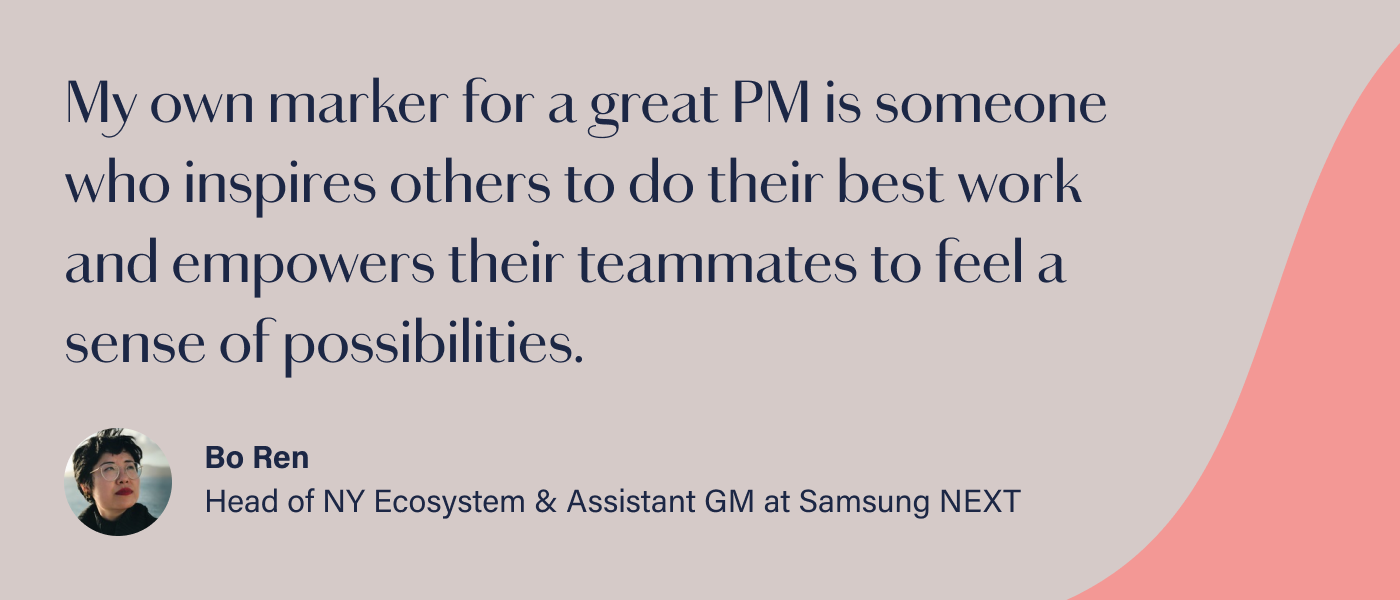
“A great PM is a janitor, armchair psychologist, researcher, and conductor of a team. You keep your team of designers/engineers/marketers and other stakeholders as happy as possible while marching in the right direction. You have a strong vision and paint it in high fidelity while corralling the team to follow a north star. My own marker for a great PM is someone who inspires others to do their best work and empowers their teammates to feel a sense of possibilities.”
Valentina , Head of Product at Klaus, puts it this way: “Being a product manager is similar to leading an orchestra: you are aware of what's happening and who needs to start adding or pausing their instruments so that the result is beautiful (or in our case, useful) for the audience. Sometimes I feel imposter syndrome creeping up because technically I am not playing any of the instruments myself. Then I remember that orchestra conductors don't play instruments either - and it is actually what makes them so valuable to the ensemble.”
TL;DR - If you excel at collaboration and strategy, own your technical chops, embrace creativity, listen intently, foster curiosity, build relationships, and tell stories - product management may be for you.
We hope this guide has been helpful for you in building your career in product management! If you want more guides and expert advice, plus candid, insider conversations from the women behind the scenes in tech, join us on Elpha.






